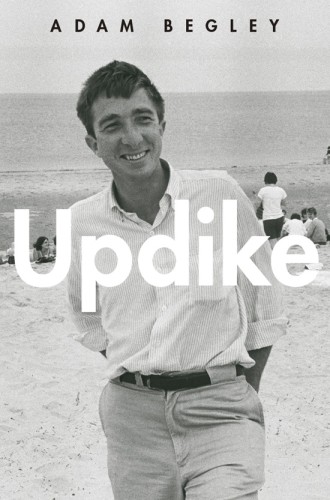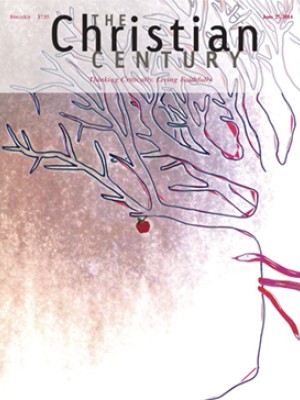Updike, by Adam Begley
John Updike was one of a small number of masters of English-language fiction in the second half of the 20th century, the only WASP in a group that includes Saul Bellow, Cormac McCarthy, Vladimir Nabokov, Flannery O’Connor, Walker Percy, and Philip Roth. This wasn’t just a matter of circumstances. Beginning at Harvard, Updike set out to immortalize middle-class America—to produce, as he wrote in a letter to his mother in those early days, “an epic out of the Protestant ethic.” And so he did in the brilliant Rabbit series of four novels and one novella, as well as in twentysome other novels, in hundreds of short stories, and in poetry, light verse, cartoons, and hundreds of essays on art, books, and popular culture.
But Updike has never been a critic’s darling. His desire for popular acclaim was probably an impediment to canonical standing. Furthermore, affability and seemingly easy popularity can turn critics sour.
Success did come early for Updike, according to this skillful narrative by his first literary biographer, Adam Begley. Less than two months after he graduated from Harvard in 1954, what Updike called “the ecstatic breakthrough” took place: the New Yorker bought the story “Friends from Philadelphia.” The magazine paid him $490, nearly half what Updike’s father earned in a year back in Pennsylvania.
Read our latest issue or browse back issues.
A year later, fresh from art school in England, the young author was working full-time at that venerable magazine—writing stories, “Talk of the Town” pieces, and light verse. Begley comments on Updike’s reaction to his rapid success: “He wasn’t despairing or thwarted or resentful; he wasn’t alienated or conflicted or drunk; he quarreled with no one. In short, he cultivated none of the professional deformations that habitually plague American writers.” The dust jacket photo portrays the Updike we know, the one with the grin.
Updike and his first wife, Mary, a Radcliffe fine arts major, met in a medieval sculpture class and married at a Unitarian church on Harvard Square where Mary’s father had been a minister before taking a similar post in Chicago. In Begley’s account, religion first comes to the fore in Updike’s life through arguments he had with his father-in-law a year after the marriage. As a child growing up at Grace Lutheran Church in Shillington, Pennsylvania, Updike had “enjoyed a comfortable, untroubled faith,” according to Begley. But when he was faced with an articulate representative of Unitarianism, his wobbly Lutheranism began to take shape. He decided that he could not respect Unitarianism’s way of avoiding “embarrassments to reason.” While in England he strengthened his religious mind and developed a spiritual resolve. He began reading G. K. Chesterton and Jacques Maritain and insisted that a Christian believes in certain “concrete attributes” of faith, such as the Eucharist.
Early on, Updike published stories with religious themes, such as “Dentistry and Doubt,” in which a minister ponders his religious doubts while sitting in the dentist’s chair. Another, “Sunday Teasing,” depicts a young man who tires of churchgoing and decides to stay home on Sundays and read St. Paul and Miguel de Unamuno in solitary contemplation of the Divine.
The 1976 novel Marry Me: A Romance is also full of religious details and doubts. Its main character is Jerry, a Lutheran who reads Barth and Berdyaev and whose wife is Unitarian, adherent of a faith Jerry regards as “pale.” Roger’s Version, published a decade later, memorably depicts a divinity school professor who is full of doubts and in conflict with an evangelical student who believes he can demonstrate the existence of God using computer technology. Then, of course, Updike made Harry Angstrom of the Rabbit cycle his “representative Kierkegaardian man,” later telling interviewers that Angstrom was an alter Updike.
Always worn lightly but seriously, religious ideas became central to Updike’s self-involved, suburban, upwardly mobile middle-class American universe for a half century. “I decided . . . I would believe,” the author wrote in his memoirs. He read widely in theology throughout his life in order to bolster the will and spilled it all into his fiction. These religious explorations are what make Updike’s writing so interesting, and Begley explores them well.
No doubt many of Updike’s stories hold clues to his life, but Begley devotes too much space in the first 150 pages to attempting to associate fictional settings, characters, even addresses, with their approximate equivalents in Updike’s childhood in Berks County, Pennsylvania, and his life in Manhattan when he worked at the New Yorker. In the rest of the book, Begley spends too much time with Updike on the couch, imagining the causes and experiences behind situations, anxieties, and marital infidelities in Updike’s fiction. For example, Begley contends that Updike’s early writing reveals a man “at once craving and resisting assimilation to a powerfully attractive, occasionally frightening milieu.” In the works completed after he moved his family to Ipswich, where they had a social circle much like themselves—white, upper-middle-class, well-educated, and Christian—Begley purports to uncover an “expression of displaced desire” and a “symptom of restlessness and anxiety.”
At one point, Begley even asserts that Updike penned a certain fictional description of a woman with one of his Ipswich lovers in mind. On another occasion he uses the first instance of extramarital lust in Updike’s fiction to approximate the date of his first real-life act of infidelity. It must be tempting to pursue these angles in order to understand the author of Couples, Updike’s sensational 1968 novel about the adulterous pursuits of ten couples in a small town outside of Boston (the novel landed Updike on the cover of Time), but Begley focuses way too much on decoding Updike’s first-person, present-tense fiction, treating it as though it is biography.
My primary impression after spending a dozen hours in this interior and exterior narrative of Updike’s relatively uneventful literary life is that he found plenty of joy. In one of his excellent collections of short prose, More Matter, published ten years before his death, Updike refers to “the happiness of creation, the rapture of creating something out of nothing.” Throughout life, he was delighted to read and write, and for those opportunities he was always grateful. Self-Consciousness, a 1989 memoir, includes this description of the undergraduate Updike attending a poetry lecture: “My heart was beating like that of a boy with a pocket of heavy nickels as he walks through the door . . . of a candy shop.” His infectious joy in literature, faith, doubt, and discovery was genuine. It filled his life and books, and it probably still turns some of his critics against him.






